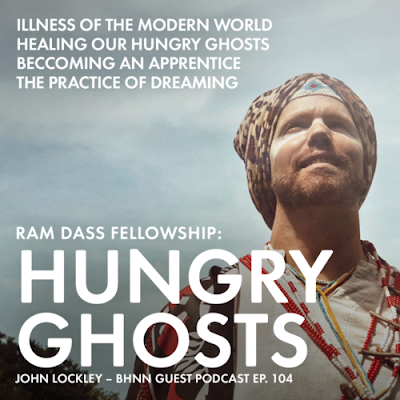A personal blog by a graying (mostly Anglo with light African-American roots) gay left leaning liberal progressive married college-educated Buddhist Baha'i BBC/NPR-listening Professor Emeritus now following the Dharma in Minas Gerais, Brasil.
Saturday, May 28, 2022
BHNN Guest Podcast – Ep. 104 – Ram Dass Fellowship: Hungry Ghosts w/ John Lockley
Via L.A. Times
|
Read more
The Lion’s Roar Podcast: Anxiety and What to Do About It with Bruce Tift
The Lion’s Roar Podcast: Anxiety and What to Do About It with Bruce Tift | ||
| This episode of The Lion’s Roar Podcast features psychotherapist and author Bruce Tift. | ||
| Anxiety
can be a pretty reasonable response to times of wide spread disease,
environmental disaster, social unrest and polarization. Associate editor
Chris Pacheco talks to Bruce Tift, psychotherapist and author of Already Free: Buddhism Meets Psychotherapy on the Path of Liberation, about attempting to control feelings of anxiety, why that only makes it worse, and what to do instead. |
||
|
Via Lion´s Roar
|
|

|
||
Smile at Fear: Pema Chodron on Bravery, Open Heart & Basic Goodness |
||
| If you want to pitch in and help solve the world’s problems, says Pema Chödrön, you’ve got to start with yourself. Here’s her advice for making friends with the fear that can hold us back. | ||
| If
we come to the understanding that we are needed and commit ourselves to
doing something about our own pain and the pain around us, we will find
that we are on a journey. A warrior is always on a journey, and a main
feature of that journey is fear. This fear is not simply something to be
lamented, avoided, or vanquished. It is something to be examined,
something to make a relationship with. |
||
|
Via Daily Dharma: Practice Without Goal
A
goalless practice is about being right here in each moment without any
conceptual objective in mind. It means putting the brakes on constantly
doing, and starting to just be in the world as you are.
Anthony Tshering, “How the Concept of Impermanence Can Help Anxiety-Ridden Millennials”
CLICK HERE TO READ THE FULL ARTICLE
Via Dhamma Wheel | Right Effort: Abandoning Arisen Unhealthy States
Abandoning Arisen Unhealthy States
|
|
|
|
|
|
|
One week from today: Developing Unarisen Healthy States
Share your thoughts and join the conversation on social media
#DhammaWheel
Questions? Visit the Dhamma Wheel orientation page.
Via The Tricycle Community
|
|
Friday, May 27, 2022
Via Dhamma Wheel | Right Living: Abstaining from Taking What is Not Given
Undertaking the Commitment to Abstain from Taking What is Not Given
|
|
|
|
|
|
|
One week from today: Abstaining from Misbehaving Among Sensual Pleasures
Share your thoughts and join the conversation on social media
#DhammaWheel
Questions? Visit the Dhamma Wheel orientation page.
Via Daily Dharma: Compassion Through Acceptance
The
power of acceptance can’t be overestimated. Accepting the basic fact of
the suffering and pain we witness, and remaining willing to experience
it, is what allows us to access our innate capacities for compassion.
Fleet Maull, “From Empathy to Compassion”
CLICK HERE TO READ THE FULL ARTICLE
Thursday, May 26, 2022
The
violence in the US this month — the killing of African-American elders
at a grocery store, Asian elders worshiping in their church, and 19
small children and two of their teachers in their elementary school
classrooms — has elicited so much pain and grief. For many, it has also
elicited a new or renewed determination to try to make this a better
world. For others, well, for now it’s just exhaustion.
We invite you to join us this Friday, May 27, at 7:00 PM ET to hold space for our collective, whatever we feel, and offer metta to all who are suffering.
With lovingkindness,
All of us at IMS
|
|
Via Dhamma Wheel | Right Action: Reflecting upon Verbal Action
Reflecting Upon Verbal Action
|
|
|
|
|
|
|
One week from today: Reflecting upon Mental Action
Share your thoughts and join the conversation on social media
#DhammaWheel
Questions? Visit the Dhamma Wheel orientation page.
Via Daily Dharma: Effortless Release
If
we really understand that nothing lasts and that everything is unreal
and illusory, then letting go is easy. Actually, it happens by itself
without effort.
Chökyi Nyima Rinpoche, “The Secret Strength of Sadness”
CLICK HERE TO READ THE FULL ARTICLE
Wednesday, May 25, 2022
Via Daily Dharma: Being the Stream
Meditation
is not just a rest or retreat from the turmoil of the stream of the
impurity of the world. It is a way of being the stream, so that one can
be at home in both the white water and the eddies.
Gary Snyder, “Just One Breath”
CLICK HERE TO READ THE FULL ARTICLE
Via Dhamma Wheel | Right Speech: Refraining from Malicious Speech
Refraining from Malicious Speech
|
|
|
|
|
|
|
One week from today: Refraining from Harsh Speech
Share your thoughts and join the conversation on social media
#DhammaWheel
Questions? Visit the Dhamma Wheel orientation page.








